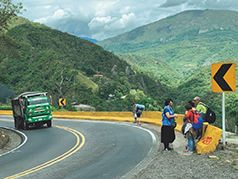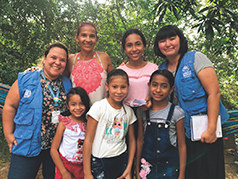Stories from the Field 7
Toward a Society Where All People Can Live in Peace
—Supporting Venezuelan refugees and migrants in cooperation with the Government of Japan—

Refugees traveling on foot across Norte de Santander Department in Colombia and talking with Associate Protection Officer Hatori (Photo: UNHCR)

An internally displaced Colombian family who fled to Norte de Santander Department due to the country’s civil conflict, together with Associate Protection Officer Hatori and her colleague at UNHCR. The family is supporting displaced Venezuelans who arrived in their community. (Photo: UNHCR)
In Venezuela, a country in South America, more than 5.5 million of its people have been displaced due to the country’s deteriorating socio-economic situation, evacuating to neighboring countries in one of the largest displacement crises in the world. Approximately 1.8 million Venezuelans have fled to Colombia, the country where I live.
The Office of the United Nations High Commissioner for Refugees (UNHCR) provides protection and assistance called R4V (Response for Venezuelans), in collaboration with the International Organization for Migration (IOM), to Venezuelans who have had no option but to leave their homes. I have been working at the UNHCR Cúcuta office, located in the border area with Venezuela in the eastern part of Colombia, since June 2018. My role includes protecting Venezuelan refugees arriving at Norte de Santander Department, including Cúcuta City and its neighboring department, coordinating humanitarian assistance programs provided by more than 50 agencies through the Interagency Coordination Platform for Refugees and Migrants from Venezuela (R4V), information management, and public relations activities.
COVID-19 began spreading across Colombia in March 2020, and from then until the day of writing (November 2020), the border with Venezuela has been closed. However, before its closure, as many as 3,000 to 5,000 refugees and migrants were flooding into the country daily, and even after its closure, many Venezuelans have been entering Colombia across unofficial borders, such as mountainous areas and rivers, in search of a guarantee of their fundamental human rights including physical safety, food, and access to health care and education. However, the presence of human trafficking organizations and armed groups in these border areas pose a security risk to Venezuelan refugees and migrants, as well as local residents. In addition, the spread of infection and strict restrictions on economic activities have left many Venezuelan people displaced in Colombia without their livelihoods, and they are now in a difficult situation where they face severe food shortages and eviction from their place of evacuation.
In response to these circumstances, the UNHCR Colombia office provides support in collaboration with partners including the Governments of Colombia and Japan. In July 2019, the Government of Japan extended 302 million yen in grant aid through an international organization for the Project for Humanitarian Assistance to Venezuelan Refugees, Colombian Returnees and Host Communities in Colombia. Following this, in March 2020, the Government of Japan provided Emergency Grant Aid totaling 1.43 billion yen (of which 396 million yen was provided to Colombia) to support displaced people in countries neighboring Venezuela (Brazil, Colombia, Ecuador, and Peru). Thanks to this aid, we provided the following assistance during the ten-month period between July 2019 and May 2020: providing legal assistance, livelihood and resettlement support, and counseling to over 40,000 people, including both Venezuelans and Colombian returnees; institutional strengthening for protection of refugees by offering relevant legal and technical advice to government organizations, their officials, and other personnel; assisting more than 70,000 people in acquiring Colombian citizenship; improving surveys on the movement, needs, and situation of refugees; and providing temporary shelters for approximately 10,000 refugees.
Moreover, the UNHCR Colombia office conducts training on the human rights of refugees and access to basic services aimed at Venezuelan refugees and migrants and their host communities, in addition to supporting their livelihoods. With the aim of integrating Venezuelan people into Colombian society, the office is also working on the “Somos Panas Colombia”* campaign, which promotes understanding of and support for Venezuelans in Colombia who have been forced to leave their home country. The campaign aims to create a society in which all residents in Colombia live in harmony by sharing values such as solidarity, empathy, and tolerance towards displaced Venezuelans in Colombia.
Governments of neighboring countries, donor countries including Japan, international organizations, private companies, civil society organizations, and local residents are already working together in their response to the Venezuela Situation. However, due to the tremendous scale of the crisis, assistance has not reached all those who need it, and more efforts to mobilize assistance are necessary. As a member of UNHCR, I would like to continue to work toward ensuring that necessary assistance reaches as many people as possible.
HATORI Atsuko
Associate Protection Officer, Cúcuta Office, UNHCR Colombia
(Dispatched under the JPO Programme)
*“Somos panas” means ‘we are friends’ in Spanish (https://somospanascolombia.com/ (in Spanish only))
<< Previous Page Next Page >>
Main Text | Reference Statistics | Reference Materials | Stories from the Field | Master Techniques from Japan to the World | ODA Topics
